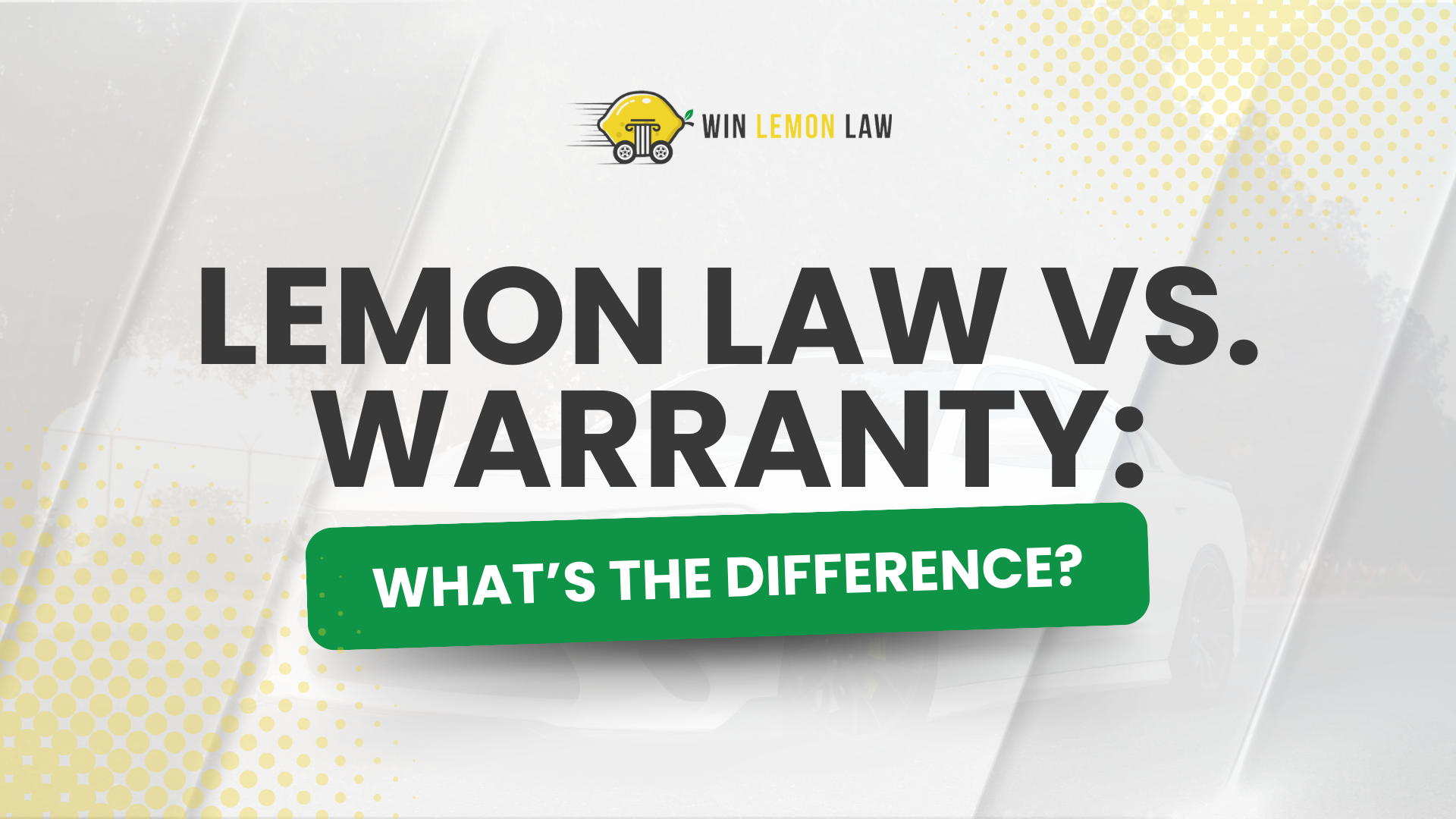Picture yourself on a scenic drive along the picturesque California coast, reveling in the joy of your recently acquired car. However, this idyllic scenario takes an unexpected turn when an unsettling hum emanates from under the hood, accompanied by a flickering dashboard light. Your excitement gives way to frustration as you realize that you’ve purchased a defective vehicle, a result of the manufacturer’s negligence in the factory.
In this post, we embark on a journey to unravel the intricacies of California lemon law versus warranty terms, offering you a comprehensive guide to navigate through the complexities of seeking justice in such situations.
Discovering that your dream car is plagued by defects can be disheartening, but being informed about your rights and options is the first step towards rectifying the situation. So, fasten your seatbelt as we dive into the details of California lemon law, the significance of your vehicle’s warranty, and the avenues available for you to pursue a resolution.
Understanding California Lemon Law
California Lemon Law, formally known as the Song-Beverly Consumer Warranty Act, stands as a robust safeguard for consumers who find themselves grappling with the frustration of owning a defective vehicle. Enacted to hold manufacturers accountable for the production, approval, and sale of faulty automobiles, this law is a beacon of protection, ensuring that consumers are not left stranded with a lemon.
Key Criteria
For a vehicle to qualify as a “lemon” under California Lemon Law, several key criteria must be met. Firstly, the vehicle should have been covered under the original warranty when the defect was first reported to the manufacturer. This ensures that the defects that arise are within the timeframe of the manufacturer’s responsibility. The defect itself must be substantial, impairing the vehicle’s safety, functionality, or value significantly. Importantly, the defect should not be a result of driver error, abuse, or neglect.
Additionally, the manufacturer must have made a reasonable number of attempts to rectify the defect. This emphasizes the importance of providing the manufacturer with the opportunity to address and resolve the issue before pursuing legal action. Alternatively, if the vehicle has been out of service for repairs for a cumulative total of 30 or more days, it may also qualify as a lemon.
Documentation
One crucial aspect of pursuing a lemon claim is the need for valid documentation. This includes records of when the defect was first reported, repair attempts made by the manufacturer, and any correspondence related to the issue. Having a well-documented case strengthens your position when seeking compensation.
Legal Assistance
Navigating the intricacies of California Lemon Law can be challenging for the average consumer. Seeking legal assistance, specifically from an experienced California lemon law attorney, becomes paramount. These professionals specialize in understanding the nuances of the law, ensuring that your rights are protected and that you have the best chance of a successful claim.
Contrary to popular belief, the goal of California Lemon Law is not to inconvenience manufacturers, but rather to ensure that consumers receive fair compensation when they unknowingly purchase a defective vehicle. By understanding the underlying principles and criteria of this law, consumers can assert their rights and hold manufacturers accountable for delivering subpar products.

The Role of Warranty in California Lemon Law
Contrary to common misconceptions, the California Lemon Law doesn’t adhere to strict timelines, such as defects occurring within the first 18 months or before 18,000 miles. Instead, the process of seeking fair compensation begins with a critical examination of your vehicle’s warranty.
Warranty Terms
Every automobile brand comes with specific warranty terms, outlining the duration and mileage coverage. These terms serve as the foundation for addressing defects within the California Lemon Law framework. It is crucial for vehicle owners to familiarize themselves with their warranty terms to understand the extent of coverage provided by the manufacturer.
Reporting Defects
If you encounter any defects with your vehicle, the initial step is to check your warranty terms. The misconception that defects must occur within a narrow timeframe is dispelled by the fact that, as long as the defect is reported within the warranty terms, it remains eligible for a California Lemon Law claim.
Warranty terms vary among different brands, with standard coverage ranging from 3 to 5 years and mileage limits typically between 36,000 to 60,000 miles. During this period, any defects reported should prompt the manufacturer to address and repair them at no additional cost to the owner, in accordance with the terms outlined in the vehicle service contracts.
Used Cars and Warranty
In a departure from many other states, California’s Lemon Law extends its coverage to used vehicles. However, the timeframe for coverage is notably shorter than that for new vehicles. Used vehicles sold by car dealers in California often come with dealer warranties, typically valid for 30 days or before 1,000 miles accrue on the odometer.
Buyer’s Guide
The terms of the warranty for used cars must be clearly outlined in the buyer’s guide, which should be attached to the vehicle while on display. The buyer’s guide informs the buyer if a dealer warranty is in place or if the vehicle is being sold “as is,” meaning there is no warranty, and the consumer assumes responsibility for any defects.
Implied Warranty of Merchantability
Even in the absence of an explicit warranty, California’s warranty law provides an implied warranty of merchantability. This unspoken warranty assures consumers that the vehicle is fit for its intended use. Implied warranties are usually valid for 60 days up to a year and cover essential components, offering additional protection for buyers.
Understanding the warranty’s role in California Lemon Law emphasizes the importance of timely reporting of defects and being aware of the specific terms outlined by the manufacturer. Whether for new or used vehicles, the warranty serves as a crucial instrument in facilitating the resolution of defects and ensuring consumers receive the quality they rightfully expect when making a significant investment in a vehicle.

Warranty Law for Used Cars
Unlike many states, California’s lemon law extends to used vehicles. However, the window for coverage is shorter than for new vehicles, typically 30 days or before 1,000 miles. Buyers should check the buyer’s guide, and an “as is” agreement implies no warranty, while an implied warranty of merchantability exists in the absence of such indication.
The Intersection of Lemon Law and Warranty Law
The ability to seek compensation under California Lemon Law is intricately tied to the status of your vehicle’s warranty. Understanding the intersection of Lemon Law and Warranty Law is pivotal in navigating the complexities of seeking justice for a defective vehicle.
Reporting Defects
One of the fundamental aspects of this intersection is the timely reporting of defects. To be eligible for compensation under California Lemon Law, your vehicle’s warranty must be valid when you formally report a defect to the manufacturer. This underscores the importance of promptly reporting any issues you notice with your vehicle, ensuring that defects are addressed within the warranty terms.
Manufacturer’s Defense
Delay in reporting defects may provide the manufacturer with an opportunity to argue that the defect is not substantial enough to warrant a claim. Manufacturers may use this delay as grounds to contest the validity of a claim, emphasizing the significance of acting swiftly to address any issues covered under the warranty.
Validity of the Warranty
The validity of the warranty during the reporting of defects is crucial. If the warranty has expired, the manufacturer may dispute responsibility for covering repair costs. However, defects reported within the warranty period, whether for new or used vehicles, should be repaired by the manufacturer free of charge, as outlined in the vehicle service contracts.
Manufacturer’s Responsibility
California Lemon Law places the responsibility squarely on the manufacturer to rectify defects that occur within the warranty period. This obligation extends to covering the costs associated with repairs and ensuring that the vehicle meets the standards outlined in the warranty terms.
Manufacturer’s Defense Strategies
It’s important to recognize that manufacturers, often equipped with formidable legal defense teams, may vigorously contest lemon law claims. Even if a vehicle unequivocally meets the criteria of California Lemon Law, the manufacturer may attempt to deny or minimize the claim. This highlights the need for legal representation to navigate the negotiations with the manufacturer effectively.
Legal Assistance
Seeking the assistance of an experienced California lemon law attorney becomes a crucial step in this intersection. These legal professionals are well-versed in the tactics employed by manufacturers’ legal teams to deny or minimize claims. By having a seasoned attorney in your corner, you not only enhance your understanding of your rights but also significantly increase your chances of securing fair compensation.
Dealing with Auto Manufacturers
Manufacturers may resist taking responsibility for defects, necessitating swift action. Consulting with an experienced California lemon law attorney becomes crucial. These lawyers understand the nuances of the process, handle negotiations, and ensure you receive the compensation you deserve.
Why Hire a California Lemon Law Lawyer
Navigating the lemon law process can be complex, making it essential to have legal representation. Lemon law lawyers work on a contingency fee basis, with manufacturers covering all attorney fees and court costs as part of the settlement.
Closing
Understanding the intersection of California lemon law vs warranty terms is essential for anyone facing a defective vehicle. If you find yourself in such a situation, remember that you are not alone. Seeking the assistance of an experienced California lemon law attorney can make a significant difference in your pursuit of justice.

